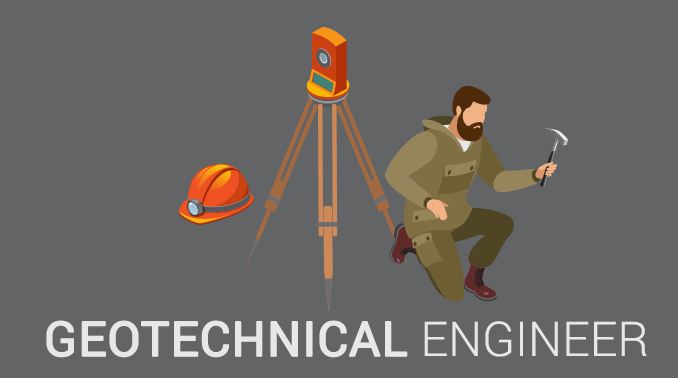The Buzz on Geotheta
The Buzz on Geotheta
Blog Article
How Geotheta can Save You Time, Stress, and Money.
Table of ContentsRumored Buzz on GeothetaThe Geotheta PDFsThe smart Trick of Geotheta That Nobody is Talking AboutThe 8-Minute Rule for GeothetaThe Definitive Guide for Geotheta

They carry out website examinations, accumulate samples, perform laboratory tests, and evaluate information to review the viability of the ground for building and construction tasks - Consulting Engineers. Based upon their searchings for, geotechnical designers provide suggestions for foundation design, incline stability, retaining structures, and mitigation of geotechnical hazards. They work together with other professionals, such as designers, structural engineers, and building groups, to ensure that geotechnical considerations are integrated right into the general task style and application
By assessing the actions and properties of soil and rock, they can recognize possible geotechnical dangers such as landslides, soil settlement, or incline instability. Their proficiency aids stop failures or accidents that could jeopardize lives and home. Below are some thorough responsibilities and responsibilities of a geotechnical designer: Website Examination: Geotechnical engineers conduct site examinations to collect information on subsurface conditions.
They analyze the information to recognize the buildings and behavior of the dirt and rock, including their toughness, permeability, compaction qualities, and groundwater conditions. Geotechnical Evaluation and Style: Geotechnical engineers assess the information gathered during website investigations to assess the security and viability of the site for construction tasks. They carry out geotechnical calculations and modeling to assess aspects such as bearing capacity, negotiation, slope stability, lateral earth stress, and groundwater circulation.
The 9-Minute Rule for Geotheta
Foundation Layout: Geotechnical engineers play a crucial role in making foundations that can securely support the designated framework. They assess the dirt problems and load needs to identify the suitable foundation type, such as shallow structures (e.g., grounds), deep foundations (e.g (https://www.brownbook.net/business/52934980/geotheta/)., stacks), or specialized methods like soil enhancement. They consider variables such as negotiation restrictions, birthing capability, and soil-structure interaction to establish ideal foundation layouts
They examine building plans, display site activities, and perform area inspections to validate that the design recommendations are complied with. If unforeseen geotechnical concerns develop, they evaluate the circumstance and provide recommendations for remediation or modifications to the design. Danger Assessment and Mitigation: Geotechnical designers examine geotechnical dangers and threats connected with the job site, such as landslides, liquefaction, or dirt disintegration.

Cooperation and Interaction: Geotechnical engineers work carefully with other specialists associated with a project, such as designers, structural designers, and building groups. Reliable interaction and collaboration are important to integrate geotechnical factors to consider right into the overall job style and construction process. Geotechnical designers provide technological knowledge, solution inquiries, and guarantee that geotechnical needs are fulfilled.
Get This Report on Geotheta
Here are some kinds of geotechnical designers: Structure Engineer: Foundation engineers specialize in designing and assessing foundations for structures. They evaluate the dirt conditions, tons demands, and website features to establish one of the most ideal foundation kind and design, such as shallow foundations, deep structures, or specialized techniques like heap foundations.
They examine the elements affecting slope security, such as dirt homes, groundwater conditions, and slope geometry, and establish methods to prevent slope failings and minimize risks. Earthquake Designer: Earthquake designers concentrate on assessing and creating frameworks to endure seismic pressures. They evaluate the seismic risk of a website, review soil liquefaction capacity, and develop seismic layout requirements to make certain the security and strength of frameworks during earthquakes.
They do field testing, visit this site accumulate examples, and analyze the gathered data to identify the soil residential or commercial properties, geologic developments, and groundwater problems at a site. Geotechnical Instrumentation Designer: Geotechnical instrumentation designers focus on tracking and measuring the habits of soil, rock, and structures. They mount and maintain instrumentation systems that check aspects such as soil settlement, groundwater degrees, slope motions, and architectural variations to assess efficiency and supply very early warnings of possible concerns.
Our Geotheta PDFs
They carry out tests such as triaxial tests, combination tests, direct shear examinations, and leaks in the structure tests to gather information for geotechnical evaluation and style. Geosynthetics Designer: Geosynthetics engineers specialize in the layout and application of geosynthetic materials, such as geotextiles, geogrids, and geomembranes. They utilize these materials to enhance dirt security, strengthen slopes, give drain services, and control erosion.
They have a tendency to be investigative people, which indicates they're intellectual, reflective, and inquisitive. They are interested, systematic, rational, analytical, and sensible. A few of them are also social, indicating they're kind, generous, cooperative, client, caring, practical, understanding, tactful, and friendly. Does this seem like you? Take our complimentary job examination to discover if geotechnical designer is just one of your top career matches.
In the workplace atmosphere, geotechnical engineers utilize specialized software tools to do computations, develop layouts, and examine information. They prepare records, evaluation project specifications, interact with customers and group members, and coordinate project activities. The workplace setup gives a conducive atmosphere for study, evaluation, and collaboration with other specialists associated with the project.
Some Of Geotheta
They often go to job websites to perform site investigations, examine geotechnical conditions, and collect data for evaluation. These check outs entail traveling to various places, occasionally in remote or tough surfaces. Geotechnical designers might do soil tasting, conduct examinations, and monitor construction activities to make certain that the geotechnical aspects of the project are being executed properly.
Geotechnical designers also operate in specialized geotechnical research laboratories. In these centers, they perform experiments, execute tests on soil and rock samples, and evaluate the engineering properties of the materials. Geotechnical research laboratory engineers function extensively in these environments, taking care of testing tools, running instruments, and videotaping data. They work together with various other laboratory team to make certain accurate and reputable screening outcomes.
Report this page